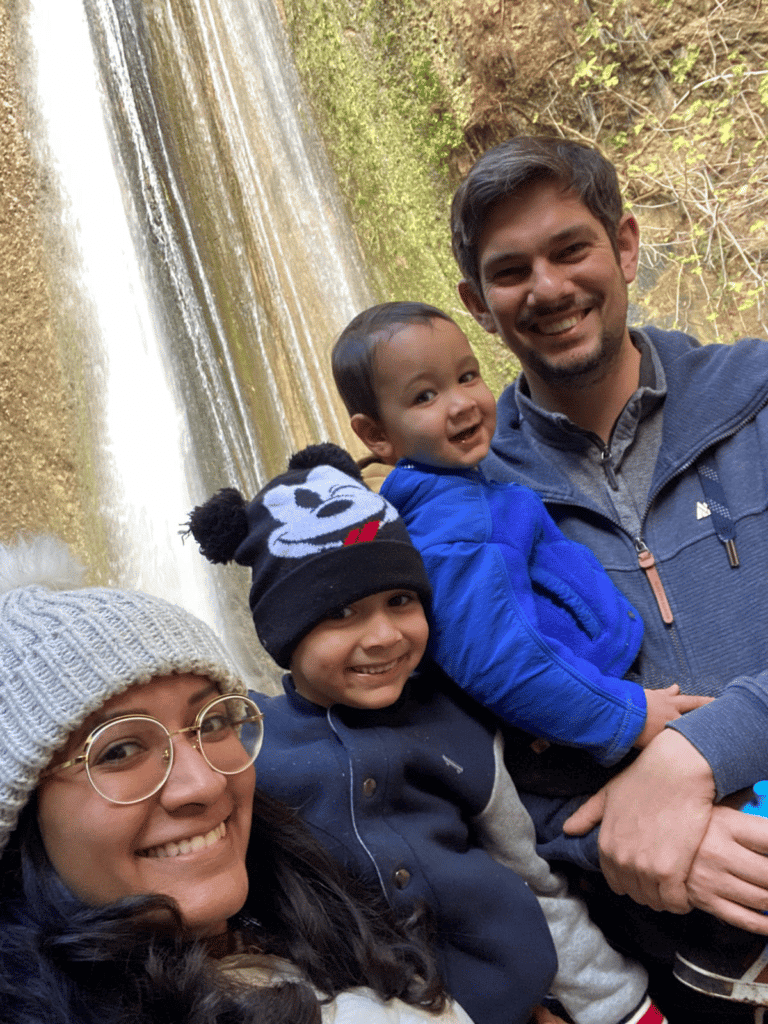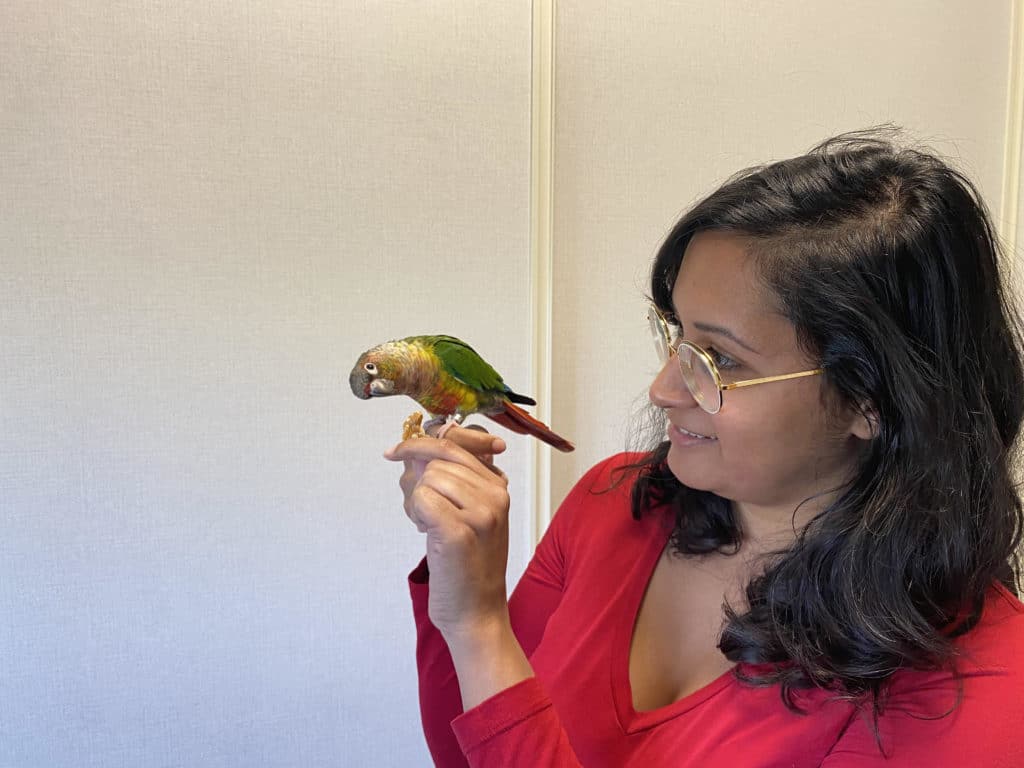Life at QM: Meet Sharen Blank, Chip Design Engineer
One of the perks of working in the quantum ecosystem is being challenged to expand your mindset and push yourself to solve problems that no one else has ever solved before. In fact, it’s one of the main reasons that motivated Sharen Blank, our Chip Design Engineer, to join Quantum Machines.
Sharen joined QM as only the 18th employee, and during the last two years saw that number grow by more than 5x. We spoke with Sharen to hear her insights on being a part of QM’s rapid growth, the professional challenges she enjoys in her work, and more.

What do you do at QM?
I do hardware engineering, and currently, I’m responsible for the Turing board called ‘stream processing’. Stream processing allows devices to respond to new data as soon as its generated, rather than having to wait to process the data in a separate step further down the line. This feature enables you to make decisions in real-time with the Quantum Orchestration Platform.
Essentially, I’m doing low-level coding on the FPGA. Currently, we’re at the stage where we’re checking our code on the chip and seeing if there are any bugs and how it’s working on the board. Usually, someone from the software team is in the office, so I’ll run a sequence from my computer remotely and have one of them check in person to see if I need to close the borders or if the connections are okay.
Initially, what attracted you to hardware engineering?
When I was in high school, we had to choose a major, and everyone around me said electronics was the best option. I didn’t even really know what it was, but I decided to go for it. Then, I grew to like the subject and became good at it. So my interest in engineering actually started and expanded from that time in high school. And even then it was clear to me that I wanted my future career to be in electronics.
In Israel, typically, you join the army right after high school, but I actually went to college first and studied electrical engineering. Afterward, I enlisted in the army and served for six years, working in electrical engineering and coding on FPGAs. During that time I realized I made the right decision for myself because I really enjoyed both the logical and mathematical sides of engineering. I really liked the day-to-day work, so I could already tell it was a good fit.
What interested you about working at Quantum Machines?
After being discharged from the army, I started looking for a job. At first, I wanted a working environment that had a similar atmosphere to the army. After doing that for a few years, however, I was ready to try something new. By then, I was really searching for a place that could challenge me professionally.
I came across Quantum Machines through LinkedIn, and after a few conversations with Ori, the Logic Team Lead, I decided QM would be a good fit for me. It seemed very interesting because I felt like this position would give me that exact professional challenge I was hungry for. Most of the companies I had worked for before QM had already developed their products and their coding, so I just built on top of that and added features here and there. At QM, I had the opportunity to really build something from scratch. I liked the fact that the company and the product were brand new. This inspired me and allowed me to create from the ground up, not relying on anyone else’s work but my own.

Can you share what a typical workday looks like for you?
Presently, my husband and I have been working from home for a while now. We’ll take turns taking care of the kids in the morning. So somedays I wake up and get the kids ready, and then he’ll take them to school, or vice versa.
Since I don’t currently have the option of getting a morning coffee with my friends at the office, I’ll usually send one of my teammates a message on Slack to catch up and see what’s new. I like to have a little social interaction to start off my day. Then, I’ll go over the task list I have for that day and get to work. There are times when I work primarily on my own while other times I collaborate more with my teammates and have more meetings and chats.
A nice after-effect of Covid is that work is much more flexible now. I can choose to pick up my kids a bit earlier and take them to the park or do something together. Then, after they go to sleep, I can continue to work if I need to. I appreciate the flexible working environment and the work-life balance. My schedule allows me to spend more time with my children in the afternoon and do a more simple task in the evening if that’s what I want to do.
What’s one of the current projects you’re working on?
Right now I’m working on a new architecture, and I’m mainly focused on the stream processor. This part of the project is quite challenging because it involves working on a brand new FPGA and exploring new technologies that no one in QM, nor in other companies, has worked with before. So I really have to get to know the FPGA itself and learn how to make it work in the most optimal way. There are a lot of bugs and technical issues that I’m actually the first person to ever encounter. So I have to go directly to the manufacturer and get them to fix those issues, which in itself can be challenging. Since this is such a novel FPGA, there’s no solution guide online, so sometimes when I ask the manufacturer questions, they won’t know the answer and will have to look it up ourselves.
The most interesting part for me right now is that I wrote the entire code for a new FPGA technology. This is one of those professional challenges that I’ve been looking forward to. Now that the coding is done, the even more interesting part is testing to make sure my code works.
You mentioned you’ve been at QM now for about two and a half years. Can you share how the company has changed since you started?
Our team has grown at a crazy pace. When I first joined, I was the 18th QM employee and the Logic team only had one other member, our Team Lead Ori. Being a part of a small team was easier in some ways because Ori and I had time to get to know each other and understand how to work well together.
We still had a lot of work to do, naturally, so we added more people to the team. I went on maternity leave after some new team members joined, and when I came back six months later, I really felt like the company had grown a lot, which was amazing to see.
It’s great that we have a larger team and that we all have our own responsibilities and tasks. There is no one person who can do everything, but now you have someone to answer specific questions and handle specific tasks. Even with that big change, there is still so much work to be done and we need to grow even more.

What’s your favorite part of your job?
This goes back to what I said about coding from scratch and starting projects from scratch. I like having a blank slate and doing something challenging without being held back. It’s nice to not have to compromise my ideas based on work done by others.
What would you tell someone that’s considering joining QM?
I think it’s a good place to grow professionally, especially since we’re doing things that no one’s ever done before.
And the fact that QM isn’t an engineering company and that our product is based on physics adds an interesting aspect to the job. I’ve learned a lot more about physics since joining QM. It’s also amazing to see where our product is being used, where it’s going to be used, and the impact it’s already having.
At the same time, the people here are wonderful. Everyone is very friendly and cooperative. I feel welcome to approach anyone about anything. And I know people here will always do their best to get me the answers I’m looking for. It really feels like a community. There is a willingness on everyone’s part to help out and support each other so that we can build something great together.